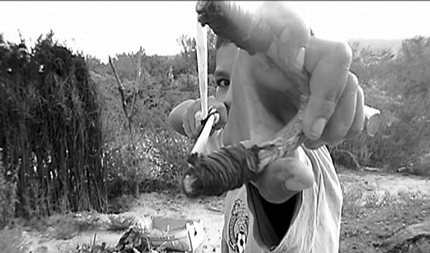Documentary bonanza at MoMA skims cream of nonfiction world cinema
Stretching over a month to accommodate a bumper supply, MoMA’s newly double-length “Documentary Fortnight” may soon want to reconsider its tag, with no sign of the documentary tide abating.
Curators Sally Berger and William Sloan have given this year’s edition admirable breadth, opening with a suite of unusual perspectives on the Iraq war. Melis Birder’s “The Tenth Planet, a Single Life in Baghdad” voices an ordinary Iraqi secretary’s candid first-person statement, while Erwann Briand’s “The Women of Mount Ararat” goes inside an all-female Kurdish guerrilla unit deployed on the Turkish-Iraqi border.
A profusion of first-rate Latin American documentaries nearly turns the series into La Quincena documental. Scott Dalton and Margarita Martinez’s “La Sierra,” first seen at last summer’s Human Rights Watch International Film Festival, is an affecting, morally ambiguous chronicle of teens enmeshed in the ruthless paramilitary gangs of Medellín’s poor hillside barrios. There’s also a peek at Kief Davidson and Richard Ladkani’s “The Devil’s Miner,” ahead of its theatrical opening next month.
Moments into Eugenio Polgovsky’s “Tropic of Cancer,” a diamondback rattlesnake speaks to us in its forked tongue, staring down the camera in close-up and sounding its warning as two men trap it with a lasso-ended stick. We are in a desert chaparral, in central Mexico’s San Luis Potosí state, hard by the eponymous 23rd parallel. In this remorseless habitat, the men and their impoverished families wrest a meager subsistence from the desert and sell its fauna and flora at a roadside stand, where trucks thundering past are the only visible avatars of larger society.
Eschewing voiceover exposition, titles, and other situating devices, Polgovsky relies on incisive camerawork and a spare, compelling aural design to portray these forgotten lives; by withholding the characters’ names he renders them archetypal. Their daily viands consist of rodents, fowl, cactus berries. Polgovsky patiently observes the men and boys knocking voles out of high saguaro branches with slingshots, or snatching hawks’ eggs and live chicks while the mothers circle ominously overhead. The humans are sometimes viewed from the perspective of their prey, gesturing at animal subjectivity.
Initial unease gives way to a more complicated tension as the subtlety of Polgovsky’s structure—and the level of his artistry—gradually becomes clear. The established rhythm of foraging and waiting is interrupted first by a TV transmission that might be coming from another galaxy, then by an associative montage of smoke-filled sunlight streaming through a window, flapping rags on a clothesline, a pregnant moon, and a wizened ancient with fantastically leathery skin. An extreme close-up of her onyx eyes as she scans the night dissolves to a pitted, seething cauldron on a stone hearth.
At the two-thirds point, the known world returns with a vengeance. Motorists appear at the roadside stand, bourgeois Mexicans for whom this place is little more than a void on the map. Coiffed, portly ladies and gents in immaculately laundered clothes pull their SUVs over to gawp at the peasants’ menagerie—“Were they born in the cage?” “No, we took them from the nest.”—and, incredibly, dicker over the price of their wares. From here the film builds swiftly to a conclusion as lucid as it is devastating.
The hills and tile roofs of Mostar, seat of Herzegovina, have rarely looked as enchanted as they do from the minaret of one of its mosques at the beginning of Paul Rosdy’s “Neue Welt,” whose title courts a not unhappy confusion with Malick’s “The New World.” A middle-aged muezzin’s call to prayer, picked up by his dewy-faced lad, is the invocation that opens this polyglot tour through cities of the former Austro-Hungarian empire, and the first in a series of ever more varied musical passages.
Hopscotching from Sarajevo to Trieste to the Ukraine, Rosdy’s absorbing odyssey across the Other Europe comes alive though encounters with an eclectic cast such as the archivist Milos Milosevic, an “admiral” of a 1,200-year-old Montenegrin fraternal order who demonstrates the Kolo (“wheel”) line dance. Did I mention the coppersmith who makes urns from bomb casings and received Madeline Albright in his workshop? These vignettes are counterpointed with voiceover excerpts from fin-de-siècle newspapers and archival footage, setting their stories into a historical continuum.
Deniza Avdibegovic, a young Muslim chorister in the Sarajevo opera, is introduced at the piano singing in duet with a friend, “rains will wash Bosnia/lilies will bloom at daybreak.” Recalling her six years as a war refugee in Germany, she talks of “returning from the West,” as if the Balkans were not part of Europe, and articulates the film’s implicit credo. Backstage at the opera, she notes in perfect German, the company includes Muslims, Catholics, and Orthodox Christians, “and it doesn’t matter who is what.”
Such lightly worn cosmopolitanism is scarce indeed on the Idaho panhandle, where Michael Culpepper and Nikki Draper’s wholesome, unadventurous “Bachelor Farmer” is set. One of a handful of queer-themed selections, “Farmer” probes the impact of a tiny circle of gay men’s coming out in Kendrick, a town of under 400 settled on the Northern Pacific line. The men’s sexuality is the only evident trace of difference in this all-white Protestant redoubt, which gets its collective mind blown when townie Jerry Galloway and formerly hetero-hitched Steve Dunning decide to hold their commitment ceremony in a local chapel.
How much more does “Documentary Fortnight” pack in? Northern California communes, drowned Chinese villages, Miami thug life, aged Mennonite weavers, and for those in a New York state of mind, subway-lore fanatics and Greenwich Village nostalgia. Capping the series is a weeklong engagement of Natalia Almada’s exquisitely crafted Mexican immigration saga “To the Other Side,” scored to a stomping narco-corrido soundtrack by Chalino Sanchez and Los Tigres del Norte. Reality to burn, in other words.
gaycitynews.com


































